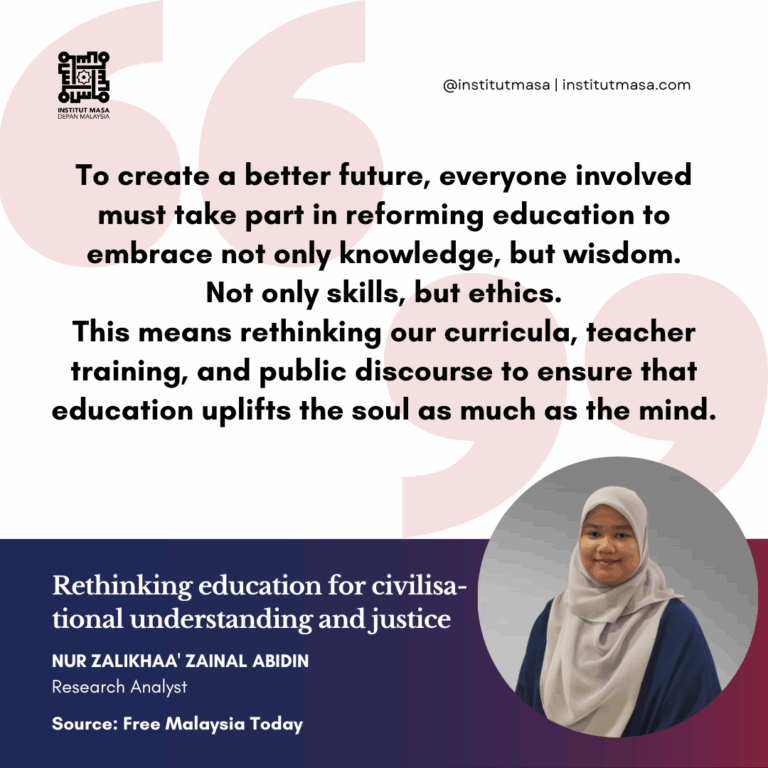Oleh Nur Zalikhaa’ Zainal Abidin
It is clear that education does not always promote understanding or tolerance.
In a world increasingly fractured by misunderstanding, division and inequality, the role of education is more critical than ever.
While societies have made impressive progress in improving access to education, literacy and qualifications, a crucial question remains: has education truly taught us to understand each other, not just as individuals but as members of diverse civilisations?
It is becoming clear that education does not always promote understanding or tolerance of civilisation.
People may be educated, yet fail to grasp the deeper meanings behind history, culture and human relationships.
Facts are known but values are missing.
One of the key reflections emerging from the International Conference on Civilisational Dialogue 2025 (iConCiDi2025), organised by the Universiti Malaya Centre for Civilisational Dialogue (UMCCD), is the need to critically examine the relationship between education, civilisation, and identity in today’s increasingly interconnected world.
While the initiative embraces a broad and ambitious theme, it is grounded in a pressing concern – education, in its current form, often falls short of fostering true civilisational understanding or meaningful tolerance.
Despite notable progress in producing educated individuals, essential questions remain unanswered: do these individuals truly understand the cultural and historical depth of others?
Are they equipped with empathy as a guiding value?
Do they recognise and honour the inherent dignity of those from different ethnic, cultural or ideological backgrounds?
This reflection urges us to move beyond conventional benchmarks of academic success and towards a more holistic vision of education – one that nurtures both the intellect and the moral compass, and, in doing so, strengthens the social fabric of pluralistic societies.
Beyond academics: towards civilisational literacy
Much of modern education is shaped by economic priorities, such as preparing students for jobs rather than life.
While this focus has built industries, it has weakened our ability to appreciate the philosophical, moral and cultural roots of civilisation.
Learners may know historical events and technical skills, but few are exposed to the ethical foundations of society and principles such as justice, compassion, dignity and coexistence.
This shortfall becomes particularly urgent in multi-ethnic societies where success depends not only on individual achievement but on social harmony and collective resilience.
Tolerance is no longer enough.
What we need is a shared civilisational understanding based on mutual respect and the recognition of human dignity.
True civilisation is grounded in justice, not merely in courts or laws, but in how people are treated in everyday life.
Justice includes economic fairness, equal opportunities, social inclusion and the right to be heard.
At the heart of this lies human dignity and the belief that every person, regardless of ethnicity, background, or belief, deserves respect and a chance to thrive.
Yet, education systems rarely teach these ideas as living principles.
Students may learn about rights and responsibilities, but not the deeper ethical questions of how to relate to others with empathy, humility and fairness.
The need for civilisational education becomes clearer when we examine present-day realities.
In Malaysia, for instance, growing polarisation and cultural misunderstandings are threatening the structure of our plural society.
According to the Malaysia Racism Report 2023 by a NGO, Pusat Komas, there were 50 recorded incidents of racism and racial discrimination in 2023.
Of these, 31.4% were politically motivated while others arose from education (9.8%), sports (7.8%), government policies (7.8%), health and other sectors (13.7%), provocations or incitement (17.6%) and xenophobia (11.8%).
These figures paint a sobering picture – that our national harmony is under strain, and education has not sufficiently prepared us to navigate it.
Without deep civilisational understanding, diverse communities risk slipping into competition instead of cooperation, and suspicion instead of solidarity.
For any nation, but especially one as diverse as ours, survival depends on our ability to transform diversity into shared identity.
This must not be through forced assimilation, but through mutual contribution and reciprocal respect.
As iConCiDi2025 emphasises, the survivability of races in a diverse society depends on their ability to co-develop to preserve their unique cultural identities while contributing meaningfully to shared national and global narratives.
To create a better future, everyone involved must take part in reforming education to embrace not only knowledge, but wisdom. Not only skills, but ethics.
This means rethinking our curricula, teacher training, and public discourse to ensure that education uplifts the soul as much as the mind.
Only by doing so can we nurture generations who are not just employable, but enlightened.
Not just informed, but understanding.
Not just citizens of a country, but participants in the making of a just and dignified civilisation.




